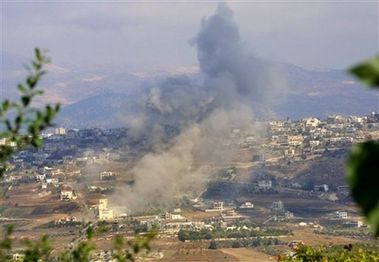 By RAMIT PLUSHNICK-MASTI, aug 13, Associated Press Writer , JERUSALEM – After a stormy debate Sunday, Israel’s Cabinet approved a Mideast cease-fire, agreeing to silence the army’s guns in less than 24 hours. The Israeli military embarked on a last-minute push to devastate Hezbollah, rocketing south Beirut with at least 20 missiles. The 24-0 vote, with one abstention, came a day after the Lebanese government approved the agreement, and Hezbollah leader Hassan Nasrallah gave his grudging consent. The truce was to take effect Monday morning.As the vote took place, Israeli shells slammed into the hard-hit Dahiyeh suburb, a Hezbollah stronghold just south of Beirut, Lebanese television stations said. Al-Arabiya said several buildings were destroyed.
By RAMIT PLUSHNICK-MASTI, aug 13, Associated Press Writer , JERUSALEM – After a stormy debate Sunday, Israel’s Cabinet approved a Mideast cease-fire, agreeing to silence the army’s guns in less than 24 hours. The Israeli military embarked on a last-minute push to devastate Hezbollah, rocketing south Beirut with at least 20 missiles. The 24-0 vote, with one abstention, came a day after the Lebanese government approved the agreement, and Hezbollah leader Hassan Nasrallah gave his grudging consent. The truce was to take effect Monday morning.As the vote took place, Israeli shells slammed into the hard-hit Dahiyeh suburb, a Hezbollah stronghold just south of Beirut, Lebanese television stations said. Al-Arabiya said several buildings were destroyed.
Earlier Sunday, Israeli warplanes fired missiles into gasoline stations in the southern port city of Tyre, killing at least ten people in those and other attacks. Fierce ground fighting involving 30,000 Israeli troops continued in the south, where Israel lost 24 soldiers Saturday, including five on a helicopter shot out of the air by the Lebanese resistence. In Jerusalem, a heated debate erupted during the Cabinet session, with minister Ofir Pines-Paz criticizing the government’s decision to order an expanded ground offensive in the days before the cease-fire is to take effect.
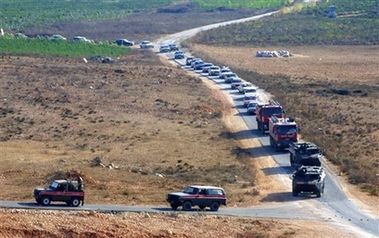 Anthony Shadid, Washington Post Foreign Service, Sunday, August 13, 2006; Page A01, HASBAYA, Lebanon, Aug. 12, Israeli troops entered Marjayoun at 3:30 a.m. Thursday. They had first seized Burj al-Molouk. Next was Qleia. The last, along a road stretching from the border, was the capital of the province, a faded, once-prosperous town that unfurls up a hill overlooking a valley carpeted in olive trees and the imposing, wizened peaks of Mount Hermon, known here as Jebel al-Sheikh."They came with the tanks, of course," said Fouad Hamra, the town’s mayor.
Anthony Shadid, Washington Post Foreign Service, Sunday, August 13, 2006; Page A01, HASBAYA, Lebanon, Aug. 12, Israeli troops entered Marjayoun at 3:30 a.m. Thursday. They had first seized Burj al-Molouk. Next was Qleia. The last, along a road stretching from the border, was the capital of the province, a faded, once-prosperous town that unfurls up a hill overlooking a valley carpeted in olive trees and the imposing, wizened peaks of Mount Hermon, known here as Jebel al-Sheikh."They came with the tanks, of course," said Fouad Hamra, the town’s mayor.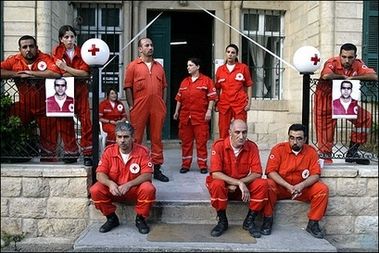 Michael Winfrey BEIRUT, Aug 13 (Reuters) – Relief agencies sent convoys towards southern Lebanon on Sunday, hoping a planned truce between Israel and Hizbollah guerrillas would mean rapid improvement in the humanitarian crisis there. Frustrated by heavy fighting and a ban on movement imposed by Israel’s army, aid workers say they have been unable to bring food, water and medicine to an estimated 100,000 people trapped south of Lebanon’s Litani River. But they said they could reach the area on short notice if a truce resulting from last week’s U.N. Security Council resolution to end the war takes place on Monday as planned.
Michael Winfrey BEIRUT, Aug 13 (Reuters) – Relief agencies sent convoys towards southern Lebanon on Sunday, hoping a planned truce between Israel and Hizbollah guerrillas would mean rapid improvement in the humanitarian crisis there. Frustrated by heavy fighting and a ban on movement imposed by Israel’s army, aid workers say they have been unable to bring food, water and medicine to an estimated 100,000 people trapped south of Lebanon’s Litani River. But they said they could reach the area on short notice if a truce resulting from last week’s U.N. Security Council resolution to end the war takes place on Monday as planned. 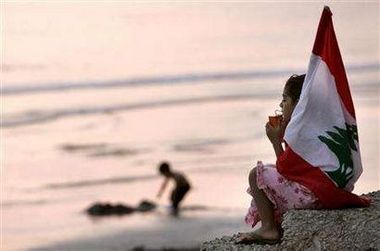 Published: Thursday, August 10, 2006, Sonia Verma reports from Beirut on how violence has caused thousands of young, university-educated professionals to leave Lebanon, possibly for good. BEIRUT – These are the trades 28-year-old Ziad Hawwa is willing to make to leave Lebanon: His swanky Beirut bachelor pad for an indefinite couch surf; the company of his elderly mother for a secure paycheque so he can support her from afar; his brand new Honda Civic for a one-way cab ride out of the country at a cost of $1,500."If I look to the future I see black," said Mr. Hawwa, nursing a bottle of mineral water in an eerily empty cafe near the pharmaceutical company where he still shows up for work in pressed khakis and a blue button-down shirt.
Published: Thursday, August 10, 2006, Sonia Verma reports from Beirut on how violence has caused thousands of young, university-educated professionals to leave Lebanon, possibly for good. BEIRUT – These are the trades 28-year-old Ziad Hawwa is willing to make to leave Lebanon: His swanky Beirut bachelor pad for an indefinite couch surf; the company of his elderly mother for a secure paycheque so he can support her from afar; his brand new Honda Civic for a one-way cab ride out of the country at a cost of $1,500."If I look to the future I see black," said Mr. Hawwa, nursing a bottle of mineral water in an eerily empty cafe near the pharmaceutical company where he still shows up for work in pressed khakis and a blue button-down shirt.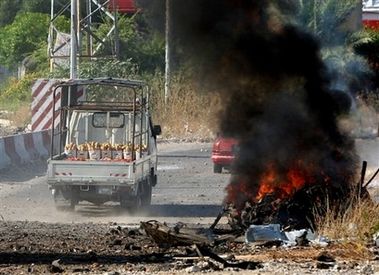 By Sam Knight and agencies,
By Sam Knight and agencies,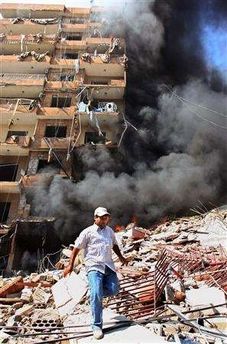 BEIRUT (Reuters) – Sunday August 6, Hizbollah killed 10 Israeli soldiers on Sunday in its deadliest rocket strike yet and Israeli bombs killed 11 Lebanese civilians as Lebanon rejected a draft U.N. resolution to end the 26-day-old war. The soldiers were killed and nine were wounded, medics said, when a rocket struck a group of reservists called up for the Lebanon offensive in the north Israeli village of Kfar Giladi. Soldiers near the scene held their heads and one wept as a military ambulance pulled away. Helicopters landed nearby to fly the badly wounded to hospitals further from the war front.
BEIRUT (Reuters) – Sunday August 6, Hizbollah killed 10 Israeli soldiers on Sunday in its deadliest rocket strike yet and Israeli bombs killed 11 Lebanese civilians as Lebanon rejected a draft U.N. resolution to end the 26-day-old war. The soldiers were killed and nine were wounded, medics said, when a rocket struck a group of reservists called up for the Lebanon offensive in the north Israeli village of Kfar Giladi. Soldiers near the scene held their heads and one wept as a military ambulance pulled away. Helicopters landed nearby to fly the badly wounded to hospitals further from the war front. 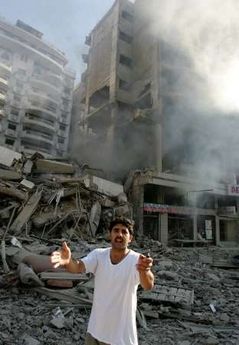 BEIRUT, Lebanon – Israeli jets fired six missiles into Beirut’s southern suburbs Sunday afternoon, Lebanese security officials said. Loud explosions shook the capital, and a column of white smoke rose over the horizon.Hezbollah and its allies rejected the U.S.-French text of the U.N. resolution, saying its terms for a halt in fighting did not address Lebanon’s demands
BEIRUT, Lebanon – Israeli jets fired six missiles into Beirut’s southern suburbs Sunday afternoon, Lebanese security officials said. Loud explosions shook the capital, and a column of white smoke rose over the horizon.Hezbollah and its allies rejected the U.S.-French text of the U.N. resolution, saying its terms for a halt in fighting did not address Lebanon’s demands 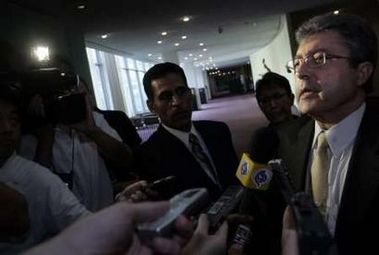 BEIRUT (XFN-ASIA) – The Lebanese government has rejected a draft UN Security Council resolution on the Hezbollah-Israel conflict, saying it would not end hostilities and asking for the text to be amended.
BEIRUT (XFN-ASIA) – The Lebanese government has rejected a draft UN Security Council resolution on the Hezbollah-Israel conflict, saying it would not end hostilities and asking for the text to be amended.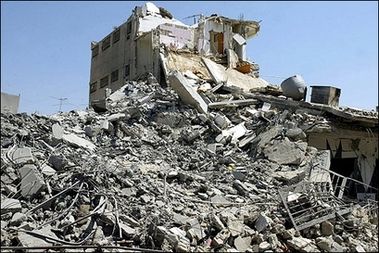 By Tom Perry, Reuters, BEIRUT (Reuters) – Ali Bajouk set off to deliver supplies to elderly relatives in the village of Aita al-Shaab thinking Israel had suspended its aerial bombardment of southern Lebanon.He was wrong. Bajouk now lies in a hospital bed in Beirut, his body, head and face wrapped in bandages to cover the burns caused by an air strike which scorched half his skin.
By Tom Perry, Reuters, BEIRUT (Reuters) – Ali Bajouk set off to deliver supplies to elderly relatives in the village of Aita al-Shaab thinking Israel had suspended its aerial bombardment of southern Lebanon.He was wrong. Bajouk now lies in a hospital bed in Beirut, his body, head and face wrapped in bandages to cover the burns caused by an air strike which scorched half his skin.


